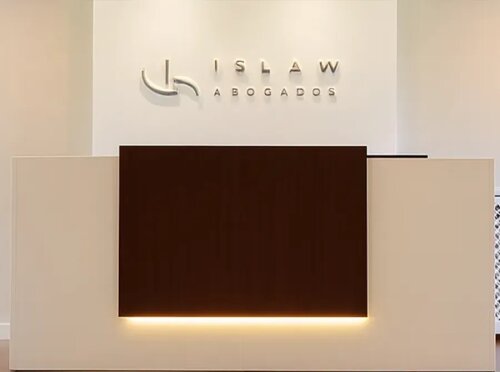Best Corporate & Commercial Lawyers in Santo Domingo
Share your needs with us, get contacted by law firms.
Free. Takes 2 min.
List of the best lawyers in Santo Domingo, Dominican Republic
About Corporate & Commercial Law in Santo Domingo, Dominican Republic
Corporate & Commercial law in Santo Domingo is a dynamic and essential area that supports both local and international businesses operating within the Dominican Republic. As the country's capital and largest city, Santo Domingo is the hub for most corporate, financial, and commercial activities. This branch of law focuses on aspects such as company incorporation, mergers and acquisitions, commercial contracts, regulatory compliance, dispute resolution, and ongoing corporate governance.
The Dominican legal framework is influenced by civil law traditions, shaped by its history and modern economic priorities. Businesses, investors, and entrepreneurs rely on a well-established corporate legal system to protect their interests, ensure regulatory compliance, and foster growth in one of the Caribbean's most vibrant economies.
Why You May Need a Lawyer
There are several situations where the assistance of a skilled lawyer versed in Corporate & Commercial law is crucial. Common reasons to seek legal help include:
- Incorporating a new company or opening a branch office in Santo Domingo
- Drafting, reviewing, or negotiating commercial contracts and agreements
- Managing mergers, acquisitions, or joint ventures
- Understanding and complying with local regulatory requirements
- Resolving disputes with partners, suppliers, customers, or competitors
- Navigating employment and labor issues related to corporate operations
- Protecting intellectual property and proprietary information
- Handling company restructuring, dissolution, or liquidation
- Dealing with tax, customs, and export-import regulations
- Ensuring proper licensing and permits for various business activities
Even established businesses can face unexpected challenges or need personalized legal strategies to grow and succeed in Santo Domingo's competitive commercial landscape.
Local Laws Overview
Corporate & Commercial law in Santo Domingo is governed by several key statutes and regulations. The primary framework includes the General Law of Commercial Companies and Individual Limited Liability Companies (Law 479-08, as amended), which outlines the steps for company formation, management, and dissolution. The Civil Code of the Dominican Republic also applies to commercial contracts and obligations.
Important aspects of local laws include:
- Multiple types of corporate entities are allowed, such as Sociedades Anónimas (S.A.), Sociedades de Responsabilidad Limitada (SRL), and branches of foreign companies
- All companies must register with the Mercantile Registry and obtain a National Taxpayer Registry (RNC)
- Commercial contracts must comply with national regulations, and certain agreements must be notarized or registered
- Foreign investment is generally welcomed and protected by law, but some sectors require special authorization
- There are specific regulations for anti-money laundering, competition, and consumer protection
- Labor laws set out minimum employment terms and regulate employer-employee relationships
- Sanctions can apply for non-compliance with tax, accounting, or reporting obligations
- Dispute resolution can be pursued through the courts or via arbitration, which is increasingly common in commercial matters
Understanding these and other local legal requirements is essential to minimize risk and operate effectively in Santo Domingo.
Frequently Asked Questions
What types of companies can I set up in Santo Domingo?
You can establish various types of companies, including a Public Limited Company (S.A.), Limited Liability Company (SRL), Individual Limited Liability Company (EIRL), or register a branch of a foreign company, depending on your business needs and investment structure.
Do I need a local partner to start a business in the Dominican Republic?
No, 100 percent foreign ownership is allowed in most business sectors. However, certain industries may require special authorizations or local participation as regulated by law.
How long does it take to incorporate a company?
The timeframe varies but generally ranges from one to three weeks, depending on the type of entity, completeness of documentation, and current processing times at the Mercantile Registry.
Are there minimum capital requirements for company formation?
Yes, the law prescribes minimum capital for certain company types. For instance, Public Limited Companies (S.A.) require a minimum subscribed capital, while SRLs have lower requirements. Details should be confirmed for each entity type.
What are the main tax obligations for businesses?
Companies must register for the National Taxpayer Registry (RNC), file regular tax returns, pay income tax, ITBIS (similar to VAT), and comply with other specific obligations depending on their business activities.
Is it necessary to have physical offices in Santo Domingo?
While not always mandatory, many company types require a registered office address in the country for legal and regulatory correspondence, as well as for tax purposes.
How are commercial disputes typically resolved?
Disputes can be handled through the Dominican courts or, increasingly, by arbitration, which is recognized and enforced locally. The choice often depends on the dispute's value, nature, and terms agreed in contracts.
What are the key labor law considerations for employers?
Employers must comply with regulations on work hours, minimum wage, employee rights, social security, contract terms, severance obligations, and workplace safety. Labor disputes are usually handled by specialized courts.
Can foreign investors repatriate profits freely?
Yes, as a general rule, foreign investors are permitted to remit profits, dividends, and capital subject to compliance with local tax and foreign exchange regulations.
What licenses or permits are required to operate a business?
Necessary licenses and permits depend on your industry and business activity. These might include operating licenses, sector-specific authorizations, sanitary permits, and municipal registrations.
Additional Resources
Here are some useful resources and organizations for Corporate & Commercial matters in Santo Domingo:
- Chamber of Commerce and Production of Santo Domingo - For company registration and business resources
- General Directorate of Internal Taxes (DGII) - Taxpayer registration and tax regulations
- National Office of Industrial Property (ONAPI) - Intellectual property rights and registrations
- Superintendency of Securities (SIV) - Regulation of securities and capital markets
- Superintendency of Banks - Oversight of banking, finance, and regulatory compliance
- Ministry of Industry, Commerce and SMEs - Business support, licensing, and sector regulation
- Local law firms specializing in Corporate & Commercial law
Next Steps
If you need legal assistance in Corporate & Commercial matters, start by clearly identifying your specific needs or challenges. Gather relevant information about your business, prospective transactions, or legal issues. It is highly advisable to consult with a qualified lawyer or law firm experienced in Corporate & Commercial law in Santo Domingo. Legal professionals will guide you through compliance, help draft or review contracts, represent your interests, and ensure you take the correct procedural steps. You can contact relevant governmental agencies or business associations for further information before your legal consultation. Taking early action and seeking expert guidance will help secure your business success and reduce legal risks in the Dominican Republic.
Lawzana helps you find the best lawyers and law firms in Santo Domingo through a curated and pre-screened list of qualified legal professionals. Our platform offers rankings and detailed profiles of attorneys and law firms, allowing you to compare based on practice areas, including Corporate & Commercial, experience, and client feedback.
Each profile includes a description of the firm's areas of practice, client reviews, team members and partners, year of establishment, spoken languages, office locations, contact information, social media presence, and any published articles or resources. Most firms on our platform speak English and are experienced in both local and international legal matters.
Get a quote from top-rated law firms in Santo Domingo, Dominican Republic — quickly, securely, and without unnecessary hassle.
Disclaimer:
The information provided on this page is for general informational purposes only and does not constitute legal advice. While we strive to ensure the accuracy and relevance of the content, legal information may change over time, and interpretations of the law can vary. You should always consult with a qualified legal professional for advice specific to your situation.
We disclaim all liability for actions taken or not taken based on the content of this page. If you believe any information is incorrect or outdated, please contact us, and we will review and update it where appropriate.
Browse corporate & commercial law firms by service in Santo Domingo, Dominican Republic
Santo Domingo, Dominican Republic Attorneys in related practice areas.















